|
|
|
Sort Order |
|
|
|
Items / Page
|
|
|
|
|
|
|
| Srl | Item |
| 1 |
ID:
103588
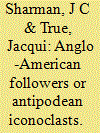

|
|
|
|
|
| Publication |
2011.
|
| Summary/Abstract |
This article examines the results of the world's largest ever survey of international relations (IR) scholars with an eye to establishing the particularities of the discipline in Australia and New Zealand. The survey covered the areas of teaching, research, the structure of the profession and scholars' views on foreign policy. From these results, this paper compares IR in New Zealand and Australia, and discusses the extent to which the discipline in these two countries is distinctive from its overseas counterparts, especially in the United States and the United Kingdom. The particular areas of focus include the degree to which the field in Australasia conforms to or differs from US or Commonwealth identities; epistemological and gender divides; the distinctive foci of what IR scholars in both countries teach and research; which publications are favoured and disfavoured; and the contrasting linkages between academia and the world of government and policy. We conclude with some suggestions about how the field in both countries might be improved.
|
|
|
|
|
|
|
|
|
|
|
|
|
|
|
|
| 2 |
ID:
084982
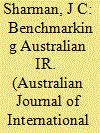

|
|
|
|
|
| Publication |
2008.
|
| Summary/Abstract |
This article assesses the global profile of Australian International Relations (IR) scholarship by measuring the presence of Australian-based scholars in leading journals and presses, relative to other non-US scholars. It presents three alternative conclusions, depending on the benchmark adopted. The first perspective, low impact, suggests that on the basis of publications in top journals, Australian IR scholars are doing a bad job, that is, Australian scholars have a much smaller presence in leading journals than could reasonably be expected. The second view, a bookish lot, is based on publication in leading book presses, and presents a much more positive picture. The third alternative, a very British affair, concludes that according to both journal and book data Australian scholars are notable for their disproportionate representation in British rather than American publication outlets. These claims are supported with publication data from top outlets over the past decade as determined by Australian and international rankings.
|
|
|
|
|
|
|
|
|
|
|
|
|
|
|
|
| 3 |
ID:
113719
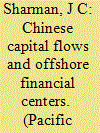

|
|
|
|
|
| Publication |
2012.
|
| Summary/Abstract |
Why is the British Virgin Islands a bigger source of foreign direct investment into China than the USA, the European Union and Japan combined? Why is there 10 times more investment from China in the Caymans Islands than there is in the USA? This paper argues that these flows represent the efforts of Chinese and foreign investors to reduce governance and measurement transaction costs. Investors avail themselves of efficient institutions in offshore centers that are absent locally. These institutional attractions include the ease of raising capital on foreign stock markets, access to reliable courts, and more flexible and sophisticated financial products. Existing explanations of these capital movements, characterizing them as criminal money or tax arbitrage, are insufficient. Evidence is drawn from government statistics, private legal advice and interviews in offshore financial centers.
|
|
|
|
|
|
|
|
|
|
|
|
|
|
|
|
| 4 |
ID:
061235
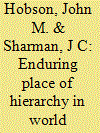

|
|
|
| 5 |
ID:
141844
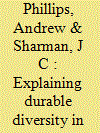

|
|
|
|
|
| Summary/Abstract |
International Relations theories generally hold that increased interaction between units in an international system produces convergence in their forms through military competition, institutional emulation, or normative socialization. In contrast, we argue that diverse international systems can endure despite increasing interaction. The early modern Indian Ocean international system hosted a variety of statist, corporate, and imperial polities. Diversity endured for three reasons. First, powerful foreign and local actors held differing maritime and land-oriented preferences for conquest, which created the potential for coexistence between unlike polities. Second, congruent European and Asian ideas of heteronomy facilitated durable polity diversity. Third, strategies of localization enhanced enmeshment. Convergence on common polity forms failed to occur despite the presence of a statist model during this period. Subsequently, a reconfigured form of diversity under colonial empires succeeded this order. Greater attention to past diverse systems coheres with recent calls to study history to better understand not only contemporary instances of international hierarchy, but also unbundled and shared sovereignty regimes.
|
|
|
|
|
|
|
|
|
|
|
|
|
|
|
|
| 6 |
ID:
119071
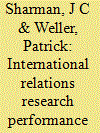

|
|
|
|
|
| Publication |
2013.
|
| Summary/Abstract |
In this research note, the authors briefly report the results of an exercise measuring the relative research performance of Australian universities in the field of international relations (IR). The findings are based on counting articles in the leading journals in the field, as determined by the Excellence in Research Australia (ERA) journal ranking. The authors also present the number of IR scholars in each university according to a 2011 survey. Three issues are addressed: the logic of journal rankings, especially in light of the decision to drop these from the ERA exercise; the method by which the data was compiled; and a discussion of the findings. These results build on and update those reported earlier for the broader discipline of political science, extending to the period 2003-11.
|
|
|
|
|
|
|
|
|
|
|
|
|
|
|
|
| 7 |
ID:
069060
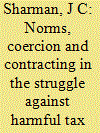

|
|
|
| 8 |
ID:
083540
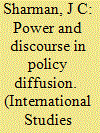

|
|
|
|
|
| Publication |
2008.
|
| Summary/Abstract |
Twenty years ago not a single country had a policy against money laundering; currently, over 170 have very similar anti-money laundering (AML) policies in place. Why have so many countries with so little in common adopted the same policy so rapidly? This extensive diffusion is particularly puzzling given the lack of evidence that AML policies actually work. In explaining the international spread of AML policies, this article draws on recent literature from International Relations, sociology, comparative politics, and public policy dealing with policy diffusion and policy transfer, but also differs from most of this work in two key aspects: First, it is argued that the process of diffusion in the developing world has been much more power-based than voluntary. Second, the mechanisms driving policy diffusion (direct coercion, mimicry, and competition) are all shown to be discursively mediated exercises of power, rather than reflecting rational learning or brute material forces. Evidence is drawn from surveys, interviews, and participant-observation in developing countries from three regions.
|
|
|
|
|
|
|
|
|
|
|
|
|
|
|
|
| 9 |
ID:
109577
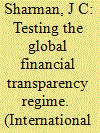

|
|
|
|
|
| Publication |
2011.
|
| Summary/Abstract |
How can we tell whether rules that apply in theory actually do so in practice? Realists argue that the gap between what formal rules proscribe and their effectiveness may be particularly wide at the international level. Furthermore, dominant states may impose costly standards on others that they themselves choose not to implement. To test these propositions, the article assesses the effectiveness of international soft law standards prohibiting anonymous participation in the global financial system by seeking to break these standards. The findings indicate that the prohibition on anonymous corporations is relatively ineffective and is flouted much more in G7 countries than in tax havens. The article contributes to and extends the work of realist scholars in international political economy, both in their skepticism of formal rules and focus on the effects of power. Evidence is drawn from the author's solicitations and purchases of anonymous shell companies from 45 corporate service providers in 22 countries.
|
|
|
|
|
|
|
|
|
|
|
|
|
|
|
|
| 10 |
ID:
154915
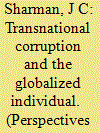

|
|
|
|
|
| Summary/Abstract |
We present a new, more transnational, networked perspective on corruption. It is premised on the importance of professional intermediaries who constitute networks facilitating cross-border illicit finance, the blurring of legal and illegal capital flows, and the globalization of the individual via multiple claims of residence and citizenship. This perspective contrasts with notions of corruption as epitomized by direct, unmediated transfers between bribe-givers and bribe-takers, disproportionately a problem of the developing world, and as bounded within national units. We argue that the professionals in major financial centers serve to lower the transaction costs of transnational corruption by senior foreign officials. Wealthy, politically powerful individuals on the margins of the law are increasingly globalized as they secure financial access, physical residence, and citizenship rights in major OECD countries. These trends are evidenced by an analysis of the main components of the relevant transnational networks: banks, shell companies, foreign real estate, and investor citizenship programs, based on extensive interviews with key informants across multiple sites.
|
|
|
|
|
|
|
|
|
|
|
|
|
|
|
|
| 11 |
ID:
124383
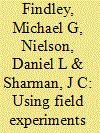

|
|
|
|
|
| Publication |
2013,
|
| Summary/Abstract |
Efforts to fight international money laundering, corruption, and terrorist financing depend crucially on the prohibition barring the formation of anonymous shell companies+ To study the effectiveness of this prohibition, we perform the first international relations ~IR! field experiment on a global scale+ With university institutional review board ~IRB! clearance, we posed as consultants requesting confidential incorporation from 1,264 firms in 182 countries+ Testing arguments drawn from IR theory, we probe the treatment effects of specifying ~1! the international standards ~managerialism!, ~2! penalties for noncompliance with these standards ~rationalism!, ~3! the desire to follow norms through complying with international standards
|
|
|
|
|
|
|
|
|
|
|
|
|
|
|
|
|
|
|
|
|